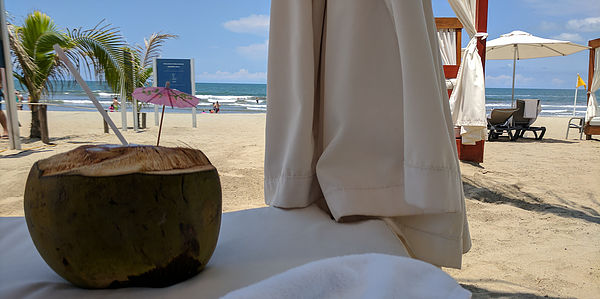Have you found that you have more personal debt at the end of this summer? A friend sent me a message recently asking “How do you afford your vacations? I always feel like I end the summer with a ton of credit card debt.” Her question made me think. This is a real problem for a lot of people. Since it’s the end of summer, the answer might be a little delayed, but let me tell you how to keep from ending the summer with a vacation-related credit card debt meltdown. The answer is pretty simple, but takes discipline, and credit cards make it easier for people to spend without discipline.
BUDGET. You have to budget. People usually laugh when I tell them how to budget because they think I’m joking. Here’s the formula: income – expenses = positive number or 0. We know that can’t happen every month because our expenses frequently will exceed what we earn. When that happens the formula looks like this: income – expenses = negative number. Where does that negative number come from? It is either covered by savings or by borrowing. Borrowing happens when we can’t afford something. Realistically, if you used a credit card to pay for your vacation and now can’t afford to pay off the credit card then it means you took a vacation you couldn’t afford. If you start planning now, then you can budget for next year’s vacation while work on paying off this year’s vacation. Here are tips for creating and staying within budget on vacation.
1. Plan by destination. If you approach your budget from this angle then it means you’re choosing where you want to go first and then figuring how much you need to put away each month in order to pay for it. If your family has always dreamed of taking a trip to that very famous theme park in Florida and you want to take the trip next year before the kids get too old to want to hang with their parents then you need to figure out how much it costs and give yourself plenty of time to save up.
When planning by destination you can view resort websites, check out packages that include lots of extras and meals. Calculate to see if the packages are worth it. Does dinner at the resort cost you an extra $40 per night? Maybe you’re better off grabbing breakfast somewhere cheaper and opting out of the package. Does the package include admission tickets to nearby attractions and make it cheaper for you to enjoy them or does it come with perks that make it worthwhile? Another way to make this easier is to hire a travel planner or travel agent. Typically they get paid by the airlines and hotels and not by you. So you can tell them where you want to go and what you want to do and ask them to figure out how much it will cost. Then you can start budgeting now. Some travel planners even work with companies that will allow you to pay a deposit and make payments, paying off your vacation prior to departure, and many do it without a fee or for much less than you’d spend on credit card interest if you take a trip you can’t afford. This can be a good strategy because it means the money is going to pay for your vacation and it won’t be sitting in your savings account where you might be tempted to spend it on something else.
2. Plan by budget. This is my personal favorite because I like the suspense and variety. This is where you figure out how much you want to spend and then go anywhere you can afford to go. Travel sites such as Google Flights, Kayak and Skyscanner will allow you to create alerts for flights to specific places at specific times. Go ahead and get passports even if you don’t have a specific destination in mind, and make sure existing passports in the family aren’t expiring soon. Sign up for alerts on several destinations you’d really like to visit. When airfare gets cheap enough to fit within your budget, compare that destination with hotel rates. If you can book and stay within budget you’re good to go. But remember, you need to have that money saved up. If it doesn’t come out of savings you’ll end up putting it on a credit card.
We’ve ended up on some great vacations doing things this way. Last spring break we went to Hong Kong and the plane tickets were about $500 each round trip. I can rarely fly within America for that amount. When we got online to checkout hotels we found that it was an ideal place to travel, and using the very inexpensive ride sharing services and the highly efficient subway system we had a very affordable adventure vacation.
There’s a caveat here–something you’re more likely to get into with this method than with the others, but I’ll wait and address it after I’ve covered the rest of “planning.”
3. All inclusive resorts and cruises. I, personally, am not a fan of cruises. However, some people LOVE them and that’s all good! When cruising in general it’s really important to consider the bucks you’ll be spending on the ship and in ports. Things like excursions, shopping, visits to the on board casino, alcoholic and non-alcoholic drinks can all add up and you’re bill at the end can be just as much or more than you paid to book the cruise. However, buying an all inclusive package reduces those cost creeps. It may look like a lot up front to pay for a package vs. just booking the cruise, but when you’re captive on a boat and realize the person at the table next to you just paid $7 for a beer and $3 for a soda you’ll be glad you did it. Do watch out for extra costs that they may hit you with on the ship such as “booking fees.”
All inclusive resorts are my second favorite method of travel after planning by budget. I like them because you’re fully paid up front and you don’t have additional costs hiding. I also like them because it’s the kind of resort where you don’t have to worry about anything. It isn’t really an adventure. You’re just getting to hang out by the beach and sip on pina coladas. You also have to watch out for fees. We’re at an all inclusive resort right now where “resort credit” is included in our package. I rented a cabana using resort credit the other day and was surprised to find out that every time I use resort credit I get hit with a 20% “fee” that I’ll have to pay at checkout. So if my package included $1800 resort credit, and I used all of it and was hit with 20% I’d need to account for an additional $360 that I’d be paying in real dollars, not resort credit dollars. Most of the time, if you’re staying at an all inclusive it’s very easy to avoid these.
A few additional pointers on the all inclusive route: A travel planner might be able to find you some great packages that include airfare, packages where kids are free, etc. and don’t forget that they can also work with you to set up payment plans. Remember to bring small bills for tips for servers, bar tenders and housekeeping. Don’t expect great food. In my experience all cruises and all inclusive resorts have mediocre food options.
Other considerations for travel budgeting: If you’re a shopper you have to budget for shopping and souvenirs. I’m usually happy bringing home photos and memories, but I always give my son some cash for souvenir spending so he can grab a shirt or trinket. Booze costs a lot in tourist traps. So if you’re a drinker and you aren’t paying for an all inclusive package, you’ll need to budget that into your savings. Restaurants can also get pricey. We went to the Keys last year and budgeted to take a chartered fishing trip. However, we didn’t account for how much we’d spend on eating out and we ended up over budget.
When you go over budget or bring home credit card debt you have to go back to the budgeting formula when you get home and back to the real world. Since no one balances a checkbook any more and can easily swipe a plastic credit card it can be tough to have the discipline to do it. What I’m getting at is that you might have to have more spaghetti or taco nights at home and less steak nights. You’ll have to make spending choices for a while to free up money to put your balance back on tract.
The last question people usually ask is “why haven’t you mentioned travel credit cards?” Rewards cards often have higher interest rates than regular cards and some have costly annual fees. If someone doesn’t have the basics of travel budgeting down then I don’t recommend having the credit cards. If a credit card starts carrying a balance forward every month and isn’t paid off then the interest paid can exceed the benefit you received from the card. However, DO apply for points programs when you fly with any airline or stay at any hotel. You can reap great benefits. Once you have mastered budgeting and savings in your everyday life then worry about the cards. When someone starts a responsible credit card rewards program he or she is immediately paying off any credit card spending so that they won’t get hit with credit card interest.


